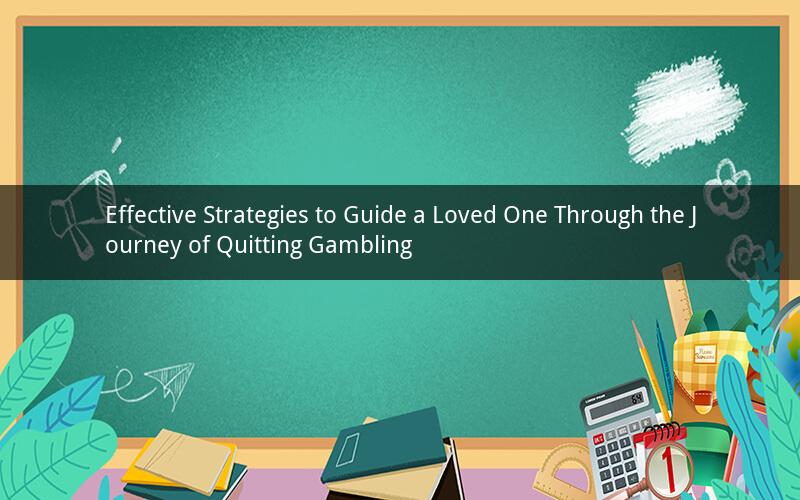
Gambling addiction is a significant issue that affects millions of individuals worldwide. It can lead to severe financial, emotional, and social consequences. If you have a loved one struggling with gambling addiction, it is crucial to provide them with the necessary support and guidance. This article outlines effective strategies to help someone quit gambling, focusing on understanding the addiction, providing emotional support, and exploring treatment options.
Understanding the Addiction
1. Educate yourself about gambling addiction: Familiarize yourself with the signs and symptoms of gambling addiction, such as preoccupation with gambling, loss of control over gambling behavior, and the pursuit of gambling despite negative consequences.
2. Acknowledge the severity of the addiction: Recognize that gambling addiction is a real and serious condition. Encourage your loved one to seek professional help and understand that they cannot overcome it alone.
3. Understand the triggers: Identify the situations, emotions, or events that trigger your loved one's gambling behavior. This knowledge can help you develop a plan to prevent these triggers and support your loved one during difficult times.
Providing Emotional Support
1. Be patient and non-judgmental: Understand that overcoming gambling addiction is a challenging process. Show empathy, compassion, and patience as your loved one navigates this journey.
2. Encourage open communication: Create a safe and supportive environment for your loved one to express their feelings and concerns. Listen actively and offer reassurance without minimizing their struggles.
3. Offer your presence: Be available to accompany your loved one to counseling sessions, support groups, or other treatment appointments. Your presence can provide comfort and encourage them to stay committed to their recovery process.
4. Help develop a support network: Encourage your loved one to surround themselves with individuals who are supportive of their recovery. This can include friends, family members, or professionals who can provide guidance and encouragement.
Exploring Treatment Options
1. Seek professional help: Encourage your loved one to consult with a mental health professional who specializes in gambling addiction. Therapy can help them understand their addiction, develop coping skills, and address underlying issues.
2. Encourage participation in support groups: Support groups, such as Gamblers Anonymous, can provide your loved one with a sense of community and understanding from others who have faced similar challenges.
3. Financial management: Help your loved one develop a budget and set financial goals to prevent future gambling-related debts. Consider seeking the assistance of a financial advisor or credit counselor.
4. Treatment centers and residential programs: In some cases, your loved one may benefit from a residential treatment program or a treatment center. These programs offer intensive support, therapy, and resources to help them overcome their addiction.
5. Celebrate milestones: Recognize and celebrate the small victories and milestones your loved one achieves in their recovery journey. This positive reinforcement can motivate them to continue their efforts.
Frequently Asked Questions
Q1: How can I help my loved one understand the seriousness of their gambling addiction?
A1: Educate yourself about gambling addiction and share this knowledge with your loved one. Encourage them to seek professional help and emphasize that overcoming addiction is a significant step towards a healthier life.
Q2: Should I confront my loved one about their gambling addiction?
A2: Yes, but approach the conversation with empathy and non-judgment. Express your concerns and offer your support. Remember that confrontation can be challenging, so be prepared for various outcomes.
Q3: Can I force my loved one to quit gambling?
A3: No, you cannot force someone to quit gambling. Addiction is a personal struggle, and recovery must come from the individual. However, you can provide support, resources, and encouragement to help them make the decision to quit.
Q4: How can I help my loved one manage financial stress related to gambling?
A4: Help your loved one develop a budget, set financial goals, and seek assistance from a financial advisor or credit counselor. Offer to help them manage their finances or seek professional help if needed.
Q5: What should I do if my loved one relapses?
A5: Relapse is a common part of the recovery process. Remind your loved one that relapse does not define their worth or the potential for success. Encourage them to continue seeking support, attend therapy sessions, and participate in support groups. Offer your ongoing support and remind them that they are not alone in this journey.